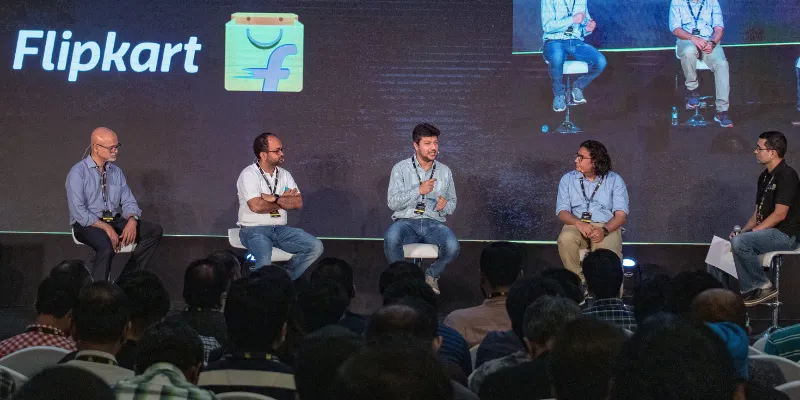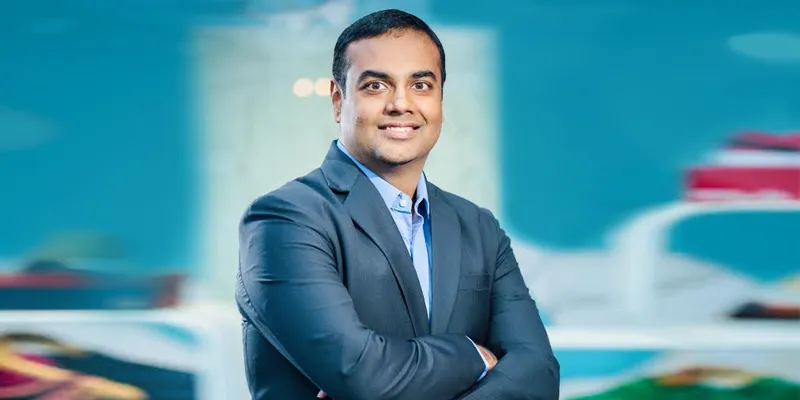The Indian ecommerce industry is expected to cross $100 billion in the next three to four years from the current $30 billion. This growth would require constant innovation driven largely by technology where users of digital commerce can transact on these platforms with greater ease.
It is with this goal in mind that Flipkart, India’s leading ecommerce marketplace, is driving innovation both from within the company and collaborating with outside players.
Jeyandran Venugopal, Chief Product and Technology Officer, Flipkart, says, “Taking the digital economy in our country into the next orbit will require the efforts of more than one company. We strongly believe digital businesses thrive on innovation, especially when there is a differentiation with new thoughts or paradigms.”

Participants at the SlashN event of Flipkart
Over the last 14 years or so, the domestic ecommerce industry has undergone various changes, primarily driven by technology. Flipkart has been constantly driving innovation as it seeks to implement new ideas.
The company has created several structured programmes to help unleash creativity without the fear of failure.
“Innovation quotient can be blunted if one start’s focusing only on delivering on things what they already know. We want to change that,” he added.
Innovation within
For example, Project 1K of Flipkart seeks to encourage its employees to constantly think about innovative solutions that have the potential to help its customers and make it scalable.
“We always encourage bottom-up innovation and many solutions have come up that way,” says Jeyandran.
This also means innovative ideas from employees who do not have a technical background that are then taken to the engineering and product teams to create a scalable solution.
Flipkart has also undertaken several initiatives to help its employees upskill themselves, which has led to the building of knowledge-sharing communities within the organisation.
He adds, “It is good to think about new things in theory but one has to apply it to see how the technology can be used to solve a problem statement.”
Flipkart’s other programmes Hackday and SlashN to nurture innovation.
Engagement with students
Flipkart is also nurturing innovation through its relationships with various external constituencies — startups and college students.
An example in this area is Flipkart Grid, an engineering campus challenge, which invites students from various colleges where it seeks solutions from them for their various problem statements.
In Grid 2.0, the theme was on software development and robotics with the participation of nearly 30,000 students from 97 colleges. These students came out with many innovations like a staircase climber robot, an intelligent picking robot, indoor drones, etc.

Flipkart Chief Product and Technology Officer Jeyandran Venugopal
Jayendran says the shortlisted ideas are supported by Flipkart in terms of mentoring, refining, and getting them the opportunity to implement the solutions.
Besides these programmes, there are several other initiatives like Wired, Trail Blazer, Girls Wanna Code, etc.
“We want to encourage women early in their college to try their hand at programming. In this we will get a more empowered, enabled and inclusive workforce,” says Jayendran.
Collaboration with startups
For Flipkart, perhaps the most important step taken to raise the level of innovation, especially in its engagement with the startup ecosystem, was its Leap programme, launched in August 2020.
Flipkart Leap is a startup accelerator programme, where selected startups undergo a 16-week mentorship with an equity-free grant of $25,000.
Jayendran says, “To improve digital commerce in India it was imperative on our part to do this. Based on the response of our first cohort, we have been inspired for the next.”
Though Flipkart Leap’s core focus is selecting startups that are associated with the ecommerce segment, the cohort also picked young companies in segments, such as agritech and neobank.
Jayendran also notes that outside of the Leap programme, there have been numerous startups that have been founded by former employees of Flipkart.
“We are proud of these startups and support them. This should cascade into a larger ecosystem where we can enable the next set of unicorns,” he says.
In all these initiatives, Flipkart’s goal is to constantly make the ecommerce platform better for customers. It has already launched several initiatives like ‘search’ in vernacular languages, voice assistants, and more. These are expected to help onboard the next set of customers, who reside outside of large metros.
In this journey, there is also an important message loud and clear to the broader ecosystem — there should be no fear of failure.
“Innovation is always about something new and is also risky. We do not want people to do only safe things. There is still very little acceptance of failure; we want to change the narrative,” says Jayendran.
It is a given today that the pace of change in technology is very rapid with constant disruptions and Flipkart believes it can stay ahead in the game only through supporting innovations that come from within and outside.










![Read more about the article [Funding alert] Silicon Valley-based Gupshup raises additional $240M from Tiger Global, Fidelity, others](https://blog.digitalsevaa.com/wp-content/uploads/2021/07/Beerud-p-1617873547843-300x150.png)